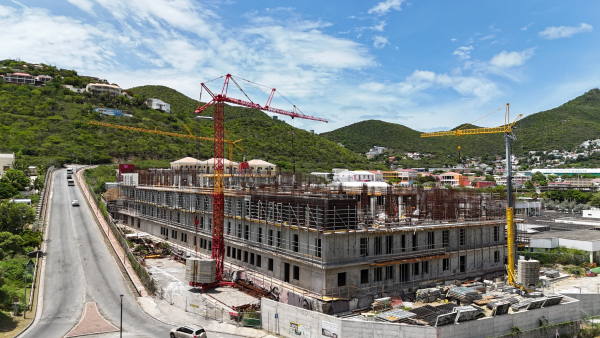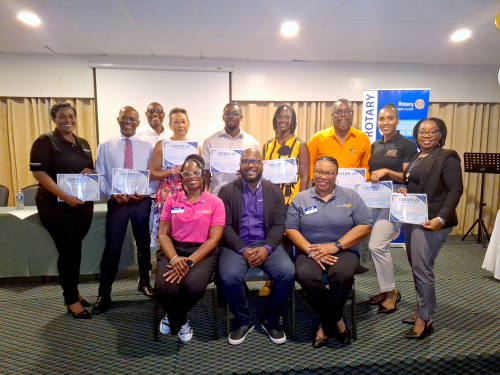 PHILIPSBURG:--- What was once heralded as a beacon of progress for St. Maarten has become a festering symbol of fiscal irresponsibility and deliberate obscurity. The New General Hospital project is no longer just delayed; it is a runaway train of unchecked spending and insulting silence from the very officials elected to serve the public interest. While the government remains tight-lipped, the bill for taxpayers continues to climb staggering new heights.
PHILIPSBURG:--- What was once heralded as a beacon of progress for St. Maarten has become a festering symbol of fiscal irresponsibility and deliberate obscurity. The New General Hospital project is no longer just delayed; it is a runaway train of unchecked spending and insulting silence from the very officials elected to serve the public interest. While the government remains tight-lipped, the bill for taxpayers continues to climb staggering new heights.
Let’s talk numbers. The project's initial price tag was already a substantial $120 million. Now, it has been confirmed that costs have exploded by at least $40 million, with rumors of another $20 million increase currently being negotiated behind closed doors. How can a project's budget inflate by a third or more without a single, transparent explanation to the people of St. Maarten? The government and the St. Maarten Medical Center (SMMC) have hidden behind a convenient non-disclosure agreement with the contractor, FINSO, treating public funds like a private slush fund.
This veil of secrecy is a profound betrayal of public trust. We are fed flimsy excuses citing redesigns, COVID-19, and global conflicts. While these are real-world challenges, they are not a blank check for financial mismanagement, nor do they grant officials a license to operate in the shadows. Hiding behind legal clauses to dodge accountability is a tactic, not an explanation. It is an insult to every citizen who will be forced to bear the burden of this fiscal disaster.
The financial shell games are becoming more brazen. In a move that reeks of creative accounting, the demolition of the old SMMC building has been conveniently offloaded to local contractors. This appears to be a deliberate maneuver to artificially lower the contractor's new asking price, simply shifting the cost from one ledger to another while the overall expense to the island remains the same, or even grows.
As Member of Parliament Omar Ottley recently highlighted, the project has ground to a halt, delayed by 200 days, with the contractor demanding millions more while its workforce reportedly dwindles. Yet, instead of addressing this crisis head-on, there is a deafening silence from the responsible parties. Where will this money come from? Will crucial public services be slashed? Will taxes be raised to cover for this monumental failure of oversight? The public is left to speculate, their trust eroding with each passing day of inaction.
This is not just about a building. It is about a fundamental collapse of transparency and good governance. The people of St. Maarten deserve more than confidential handshakes and vague reassurances. They deserve—and must demand—immediate, public disclosure of the new budget, a clear and honest plan for covering these outrageous costs, and accountability for those who have allowed this project to spiral out of control. Anything less is an unforgivable dereliction of duty.






 PHILIPSBURG:--- Edward “Eddie” Emanuel Violenus began playing music at age 16 and continued well into his 80s, up until shortly before his passing in February 2026. His accordion became the soul of the legendary Tanny & The Boys sound.
PHILIPSBURG:--- Edward “Eddie” Emanuel Violenus began playing music at age 16 and continued well into his 80s, up until shortly before his passing in February 2026. His accordion became the soul of the legendary Tanny & The Boys sound. PHILIPSBURG:--- The Rotary Club of St. Martin Sunset proudly hosted its Home Ownership Session, “From Dream to Deed,” at Carl’s Unique Inn & Conference Facilities, drawing an impressive turnout of approximately 100 attendees.
PHILIPSBURG:--- The Rotary Club of St. Martin Sunset proudly hosted its Home Ownership Session, “From Dream to Deed,” at Carl’s Unique Inn & Conference Facilities, drawing an impressive turnout of approximately 100 attendees. PHILIPSBURG:--- “You are the real doers of this community,” said Prime Minister Dr. Luc Mercelina at the Tzu Chi St. Maarten 2025 Year-End Blessing Ceremony, held two days before the Chinese New Year on February 15, 2026.
PHILIPSBURG:--- “You are the real doers of this community,” said Prime Minister Dr. Luc Mercelina at the Tzu Chi St. Maarten 2025 Year-End Blessing Ceremony, held two days before the Chinese New Year on February 15, 2026.




